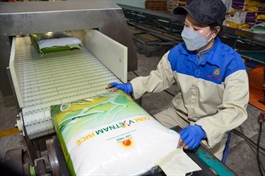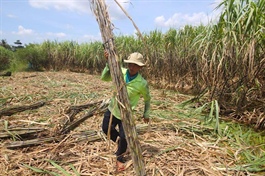Petrol prices fall but savings not passed on to goods
Petrol prices fall but savings not passed on to goods
Experts gathered in Ha Noi on August 4 to discuss how to deal with the continuing high prices of commodities in Viet Nam despite petrol prices being reduced.

At a seminar held by the Government Portal, representatives of State management agencies and economic experts clarified the reasons for the “not cooling” status of some goods and services even though petrol prices have much reduced.
In recent days, the price of gas and petrol decreased several times in a row and was as much as in January 2022.
The price of E5 gasoline was at VND24,629 per litre, RON95 gasoline cost VND25,608 per litre, and the oil price was below VND25,000 per litre, pleasing businesses and residents after a long period of increases.
However, they also saw prices of many essential commodities in the country continue to stay at a high level, such as pork prices and passenger freight. Food cost rises negatively affect people’s lives, especially when the whole country is trying to recover after the pandemic.
At the seminar, Deputy Director of the Ministry of Finance's Price Management Department Dinh Thi Nuong said: "Producers of many commodities were affected by the price of petrol and oil before they increased their products' prices. So when the price of petrol went down, they could not reduce prices immediately. They have to take into account factors that affect prices to avoid suffering losses."
Agreeing that producers must be cautious when adjusting prices, economist Can Van Luc said: “A delay in reducing prices should not be months, but just a few weeks. They have to make adjustments.”
Luc also suggested that the authorities must closely follow the developments of the market.
“It is very important to take the feedback of the people and consumers,” he said. “People have the right to complain about the fact that prices of petrol and oil have decreased, but prices of transportation and some goods remains the same. They have the right to report this to the authorities. I also hope that the authorities take timely measures, otherwise, people will feel discouraged.”
Luc said the problem of intermediary and logistics costs was still large, adding if there were fewer and better intermediate stages for the logistics, it would help reduce costs.
He also mentioned boosting non-cash payments and reducing administrative and transaction costs.
Expert Vu Vinh Phu agreed that intermediary costs were a problem. He said Korea and Thailand have a short supply chain for food, so 70 per cent of the profit belongs to farmers while the remaining 30 per cent goes to other stages.
He add that in Viet Nam, due to many intermediate stages, there is a huge gap in prices from farmers to customers. For example, if a bunch of morning glory from farmers is VND2,000, it can be sold at VND6,000 or much more to consumers.”
Phu said accelerated administrative reform was needed for production and transport businesses as even if they want to accelerate the pace of price adjustment, they must go through a lot of procedures.
According to experts, to ensure a healthy market and stable prices, it is necessary to implement synchronous solutions, especially market transparency, reducing intermediaries, and implementing corporate culture.
In response, MoF representative Dinh Thi Nuong said the ministry had several solutions.
In the face of the recent decrease in petrol prices and the tendency of many commodity prices to remain high, the MoF has worked out measures to strengthen price management and has submitted them to the Government.
The MoF has also been submitting a plan to adjust VAT, an excise tax on gasoline and an import tax on unleaded motor gasoline to reduce the cost of importing gasoline and diesel fuel, ensuring diversification of import supply.
Additionally, the ministry has strengthened the inspection of declaration of prices of goods, particularly essential goods and services, which are directly affected by gasoline.
The Ministry of Finance will continue to monitor market price movements and the production situation to take measures to stabilise prices.



























